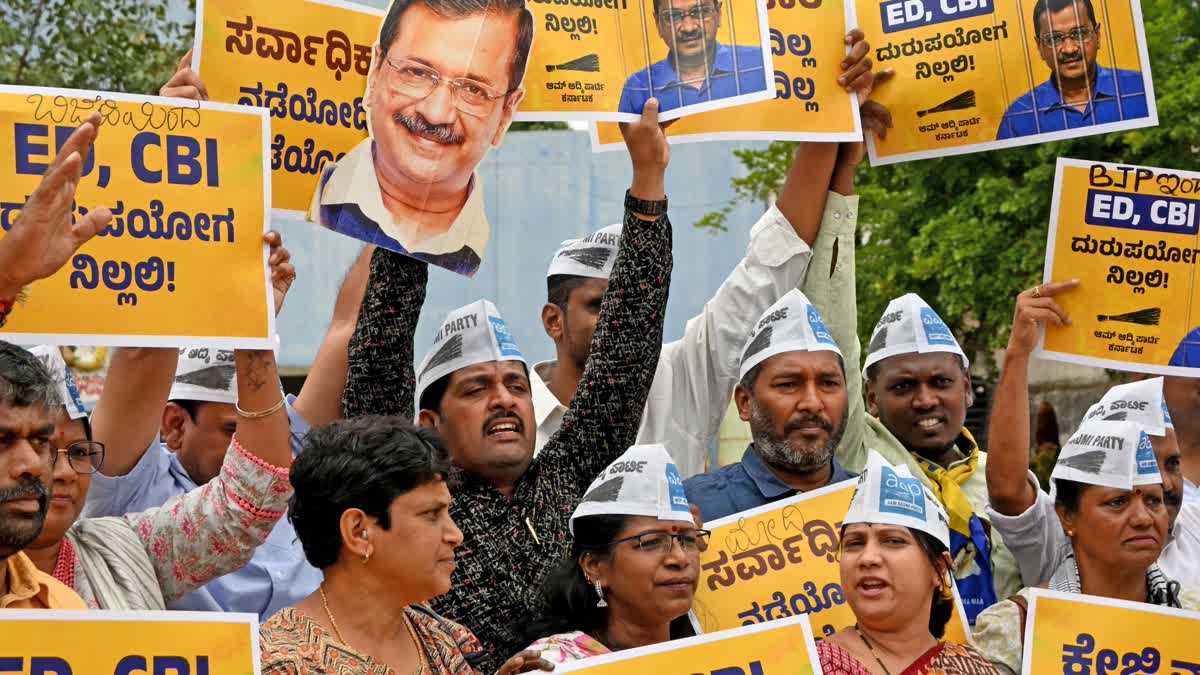New Delhi: In a huge relief for Delhi Chief Minister Arvind Kejriwal, the Supreme Court on Friday said he can be released on interim bail. Kejriwal had moved the apex court challenging his arrest by the Enforcement Directorate in a money laundering case linked to the liquor policy case.
Justice Sanjiv Khanna, pronouncing the judgement on behalf of the bench, said we doubt if the court can direct an elected leader to step down and not function as chief minister, and “ we leave it on him”.
The apex court noted that Kejriwal has suffered from incarceration for over three months and said “We direct that Kejriwal will be released on interim bail, we are conscious he is an elected leader.”
Justice Khanna said that the court felt whether the question of need and necessity of arrest could be read into Section 19 of PMLA based on the doctrine of proportionality referred to the larger Bench.
The bench framed the questions: whether need and necessity are about formal parameters of arrest, and whether can it be read into Section 19 PMLA and then grounds the court will look into. Justice Khanna said: “We have held mere interrogation does not allow arrest.”
The detailed judgement on the matter will be uploaded later in the day.
On May 17, a bench comprising justices Sanjiv Khanna and Dipankar Datta reserved its verdict after hearing senior advocate Abhishek Singhvi, representing Kejriwal, and additional solicitor general SV Raju, representing the Enforcement Directorate.
The apex court had examined the case files and statements of the witnesses and accused recorded after October 30, 2023, the day senior AAP leader Manish Sisodia, who is also an accused in the case, bail plea was rejected. Sisodia is an accused in both the corruption and money laundering case linked to the alleged scam.
During the hearing, the Enforcement Directorate had told the Supreme Court that it will file another charge sheet in the Delhi liquor policy case before the trial court today, where it will name AAP as an accused. Raju argued that there was evidence of money being sent to AAP through hawala channels. The bench queried if it was mentioned in the "reasons to believe" recorded in writing for the arrest.
The ED’s counsel replied that they have not given it in the reasons to believe and added that these aspects need not be stated in the "reasons to believe". Raju stressed that if the material is supplied to the accused prior to arrest, it might hamper the investigation. Against the backdrop of Section 19 of the Prevention of Money Laundering Act, the bench queried Raju that to say that the accused is guilty, the investigating officer must have reasons to believe on the basis of material possession.
In the rejoinder, against the backdrop of ED’s claim regarding hawala transactions, Singhvi argued that there is no iota of material on grounds of arrest. He stressed that the central agency gave weight to one inculpatory statement while ignoring nine exculpatory statements from witnesses.
On March 21, the ED had arrested Kejriwal in the money laundering case. On May 10, the apex court granted interim bail to Kejriwal for campaigning in the Lok Sabha elections. The court had directed him to surrender on June 2 and go back to jail.
The apex court has barred Kejriwal from visiting his office or the Delhi secretariat and signing official files unless absolutely necessary for obtaining the lieutenant governor's approval.



